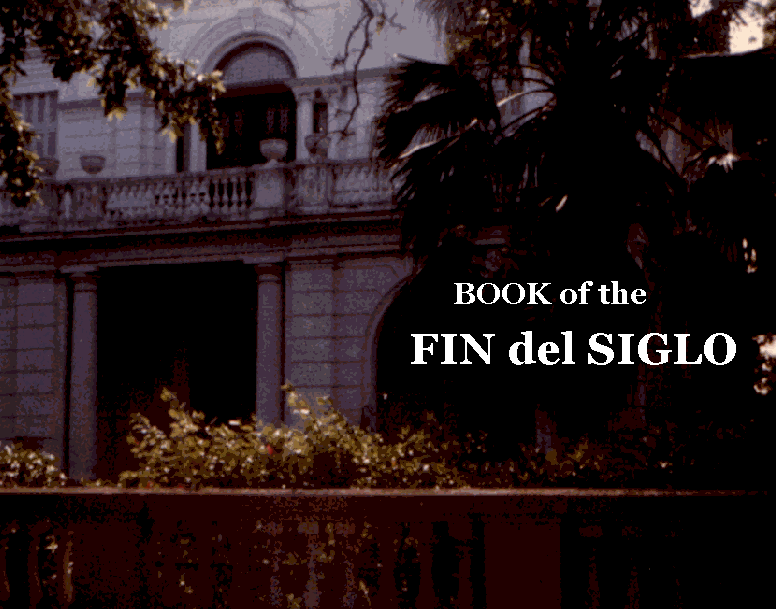THE INSURGENCE
of CHAN SANTA CRUZ

|
CHAPTER ONE |
On the
next-to-last day of the nineteenth century Esteban Chan, henequero
of the hacienda of Antonio Macias, approached the mayordomo,
Armando Feliz, with a request for a loan upon his
wages for the purpose of marrying the second daughter of Juan Po.
The mayordomo, frowning, tugging at the scraggly whiskers which
approximation of a beard nonetheless pleased him as a benefit from unknown
Spanish ancestors, opened his account book where the name of Esteban and his
indebtedness was written in the red ink that the hacienda, Idznacab,
supplied him with. Despite his visible displeasure, marriage would mean
children and, in time, more accounts entered in the thick green book. Expenses
for the celebration... alcohol and vegetables, meat and candy for the
celebration and a gold bridal chain would go to the tienda
de raya, the company store in which Armando held a
quarter-interest. And... there was the opportunity of a reward from the jewelry
seller.
Debt
was as natural to laborers of Idznacab as rains to
June or mild afternoons to January. Even thirty cents a day... besides the
right to water, one plot of land for a hut and another for their corn... was
not enough to keep the careless henequeros out of
debt. Armando realized the many festivals played some small part in this, but
if the thoughts and energies of the Maya were turned away from such rebellions
as had occurred only fifty years earlier, the cost of food and drink and
offerings that found their way into Armando's book were worth the bother.
For
Armando had a final advantage. Under the law of the Mexican state of Yucatan,
the debts of peons were never discharged, only passed on to their children and
children's children. The dead cow, sick child and broken machete lived on eternally,
passed from Esteban's father to the son and, someday, to the grandchildren yet
to be conceived. Four years of careful economizing and sacrifice had barely
halved the debts of dead Fernando Chan and, with the marriage expense, the
figures in Armando's book would be higher than they'd ever been.
"Agreed?"
the Mayordomo asked, pointing to the new sum at the
bottom of the column. Esteban nodded... a formality, as he could neither read
nor write nor count past twenty.
"Listen
muchacho," Feliz
volunteered, for the marriage would be a good one and encouragement was
warranted. "The montes celebrate their
new year in the city tomorrow and half a dozen men will have to be brought
there to give such assistance as..." and, at this, he stroked the thin
beard thoughtfully.
"At
any rate," he continued, "now that I have helped, you would not fail
your duty, nor would you fail the Padron?"
"Never,
don Armando."
"Then
there is the matter of your wages. A great day tomorrow is, and after that, muchacho? I shall tell you, it is the fin del siglo, the passing of the nineteenth century into the
twentieth, at the end of which our lord Jesucristo
returns to deliver all men from toil and want. We shall not see that day nor
shall our children, but theirs... and theirs?" He held his thumb and
forefinger together and nodded. "So in the honor of the day, don Antonio
has declared five pesos to those fortunate ones who assist in the
festivities."
"No
man is generous as don Antonio," Esteban volunteered. The thirty cent wage
of Idznacab was, in itself, remarkable. Few haciendas
paid as much as a peso and a half per week and some... in the vicinity of Dzitas and Espita... offered even
less.
"Of
course," the mayordomo added as an afterthought,
"the manner of the transportation and the loss of work here is something I
must account for... the carretera, driver and the
oxen. These charges I could not pay myself and for those I hire, I could not
provide such passage at a price of less than... two pesos." Although his
voice remained steady, the speed with which he stroked the little brush
increased. "You do understand the justice in this, muchacho."
"Of
course," Esteban said.
"As
for the two days labor lost, as well as two more in
transit and perhaps three," Feliz reflected long
enough to see Esteban dig the toe of his sandal into the dirt, "well... a
married man takes on expenses and every centavo is a blessing. Consider those
days my wedding gift."
Esteban
counted slowly. Three pesos remained, three pesos less of debt in don Armando's
book. The curandero, Mariano Chable, had been
accurate in his estimation of the day as a fortunate one, despite the mayordomo's greed, which came as no surprise and thus
caused little injury. "Dzulob (devil),"
Esteban swore under his breath. "Mil gracias, don Armando," he said
aloud.
"De
nada," said the mayordomo, extending the bottle
of red ink and account book to the peon who rubbed his hand with the fluid and
pressed it against the blank page opposite the figures. Like hand-prints in the
ruined temples Esteban had played in and puzzled over as a child, the red print
and numbers sealed the debtor's place in time.
RETURN to HOMEPAGE
– “THE INSURGENCE of CHAN SANTA CRUZ”
RETURN to GENERISIS HOMEPAGE